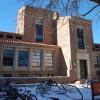News
 Thomas Edison famously said that genius was “one percent inspiration and 99 percent perspiration.” For the last 77 years, summer work and study in CU-Boulder’s Ketchum Arts and Sciences building inevitably involved sweat. The building had no air conditioning. Thanks to a major renovation, that and many other architectural deficiencies are being corrected.
Thomas Edison famously said that genius was “one percent inspiration and 99 percent perspiration.” For the last 77 years, summer work and study in CU-Boulder’s Ketchum Arts and Sciences building inevitably involved sweat. The building had no air conditioning. Thanks to a major renovation, that and many other architectural deficiencies are being corrected. CU-Boulder’s David Shneer is known for his historical research on photojournalists who chronicled the Holocaust in World War II Soviet Union; they witnessed and recorded the slaughter of Soviet citizens including those who, like the photographers themselves, were Jewish. Now, Shneer is curating an exhibition of the photographs in Illinois that appears in English and, for the first time, Russian. Soviet Holocaust survivors and Soviet WWII veterans have responded favorably.
CU-Boulder’s David Shneer is known for his historical research on photojournalists who chronicled the Holocaust in World War II Soviet Union; they witnessed and recorded the slaughter of Soviet citizens including those who, like the photographers themselves, were Jewish. Now, Shneer is curating an exhibition of the photographs in Illinois that appears in English and, for the first time, Russian. Soviet Holocaust survivors and Soviet WWII veterans have responded favorably. CU-Boulder Associate Professor Hillary Potter went to Ferguson, Missouri, to research the protests surrounding the death of Michael Brown, who was killed by a police officer. Potter visited Ferguson to pursue knowledge and to help spread the message of the town’s black people.
CU-Boulder Associate Professor Hillary Potter went to Ferguson, Missouri, to research the protests surrounding the death of Michael Brown, who was killed by a police officer. Potter visited Ferguson to pursue knowledge and to help spread the message of the town’s black people. Ancient Greece has been intensively studied, but there is still much to learn, particularly in some rural parts of the country. CU-Boulder students, under the guidance of a CU assistant professor, are among those unearthing new artifacts.
Ancient Greece has been intensively studied, but there is still much to learn, particularly in some rural parts of the country. CU-Boulder students, under the guidance of a CU assistant professor, are among those unearthing new artifacts. A dozen senior CU-Boulder performance majors auditioned before casting agents through the Actors Connection in New York City this year. The trip was so successful, another group of CU-Boulder seniors returns next year.
A dozen senior CU-Boulder performance majors auditioned before casting agents through the Actors Connection in New York City this year. The trip was so successful, another group of CU-Boulder seniors returns next year. A team of researchers at the University of Colorado Boulder has used neuroimaging techniques to understand associations between brain function and risky behavior in adolescents, moving one step closer to definitively diagnosing dangerous predispositions to risk-taking.
A team of researchers at the University of Colorado Boulder has used neuroimaging techniques to understand associations between brain function and risky behavior in adolescents, moving one step closer to definitively diagnosing dangerous predispositions to risk-taking. CU-Boulder research adds to evidence that kids’ hesitation to speak up does not indicate a lack of language ability.
CU-Boulder research adds to evidence that kids’ hesitation to speak up does not indicate a lack of language ability. Mindfulness Based Cognitive Therapy, which has been shown to help people avoid recurring bouts of depression, can be delivered effectively online and could be more effective than traditional forms of therapy, a team of researchers led by CU-Boulder psychologists has found.
Mindfulness Based Cognitive Therapy, which has been shown to help people avoid recurring bouts of depression, can be delivered effectively online and could be more effective than traditional forms of therapy, a team of researchers led by CU-Boulder psychologists has found. While numerous studies published since the 1970s have documented gender-based violence against college women, much nonviolent gender-based abuse goes unreported by victims and unaccounted for by experts, University of Colorado Boulder researchers report.
While numerous studies published since the 1970s have documented gender-based violence against college women, much nonviolent gender-based abuse goes unreported by victims and unaccounted for by experts, University of Colorado Boulder researchers report. The Colorado European Union Center of Excellence (CEUCE) is a CU-Boulder organization that promotes understanding of the European Union (EU) and transatlantic relations between the United States and the EU.
The Colorado European Union Center of Excellence (CEUCE) is a CU-Boulder organization that promotes understanding of the European Union (EU) and transatlantic relations between the United States and the EU.

